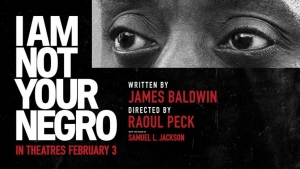
Jessica Snouwaert, Staff Writer
March 5th, 2017
The film I Am Not Your Negro, directed by Raoul Peck, opened in theaters this February and is composed of James Baldwin’s writing from nearly 40 years ago. Baldwin wrote about race in the US during the mid-1970’s, yet his words ring far too clear for a 2017 viewer. The film is constructed around an unfinished book Baldwin wrote about the lives and deaths of Medgar Evers, Malcom X, and Martin Luther King Jr. It is truly a cinematic masterpiece, moving seamlessly between voice-over narration read by Samuel L. Jackson (which draws entirely from Baldwin’s writing), television interviews with Baldwin, historical photographs and clips, and snippets from past Hollywood movies and shows.
Baldwin’s voice and thoughts are two-fold through Jackson’s narration and Baldwin’s television interviews. At first it is difficult to connect the two as being one in the same, but it is easy for the viewer to jump into the rhythm of the film. During the film, the viewer clings to each and every one of Baldwin’s words. He is perceptive and critical, as if able to look directly into the viewer’s consciousness, asking questions about race that require deep introspection and should not go unanswered.
This film does what few others can, even at the best of times: it challenges white viewers with the rawest of truths, making them question the very core of society and themselves. Peck uses a multitude of techniques to accomplish this. Some of which include stark contrasts of cheerful visuals and audio with moments of the utter brutality, which highlight some of the deepest hypocrisy within the United States. The stark reality of the images the film uses forces a white viewer to acknowledge privilege that may have previously been avoided, evoking profound emotion and thought. It goes beyond what we see in our grade school history books. It is harsh and it is real. But it is not despairing, for Baldwin says in the film, “I can’t be a pessimist because I’m alive. I’m forced to be an optimist.”
I cannot walk away from this film unchanged, returning to daily life the same way. I first wanted to see the film because beyond it being an incredible piece of art, I felt that it was my responsibility. The moment the lights came up in the theater I was struck with frustrated tears and anger. I was angry with the past. I was angry with my country. I was angry with myself. This film woke me up to the true responsibility. This film will evoke emotions and thoughts with which some people rarely dare to engage, but it is time we do so, it has always been time.
